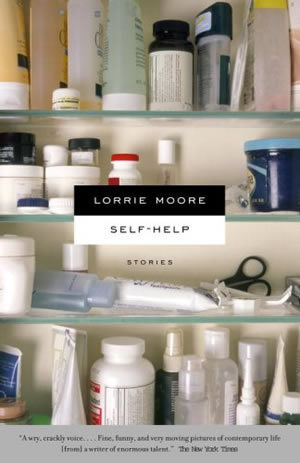For my thesis colloquium course at Notre Dame this past fall, I read “People Like That Are the Only People Here,” a short story by Lorrie Moore. Captivated by her wit, emotional power, nimble language and pithy social insight, I vowed to find more Moore. Finally — seven months, a complete thesis and one diploma later, I did.
Thrilled at the prospect of reading for pleasure (who knew such a thing could be so hard to come by for an English major?), I purchased three of Moore’s books and decided to read them chronologically by publication date.

Moore’s first full-length work is the collection of short stories, Self Help, which she published in 1985 at the age of 28. She wrote most of the pieces for her Creative Writing MFA thesis at Cornell, and the work received widespread critical acclaim, drawing praise from People, the San Francisco Chronicle, Vanity Fair and The New York Times. A review from the latter called Moore’s stories “fine, funny, and very moving pictures of contemporary life [from] a writer of enormous talent.” The collection of nine short stories features a variety of female protagonists who navigate unfulfilling romances, mind-numbing jobs, damaged family relationships, mortality and madness.
Moore confronts the gloomy — even tragic — aspects of daily American life, but what struck me first about her writing was its humor. The narration weaves comedy into the melancholic with an ease that might risk irreverence if not for its sincerity. In the gravest of moments — a woman suspects her husband of an affair, a child is caught in the middle of her parents’ divorce, a woman grapples with her terminal illness — Moore manages to make me laugh. But to call this effect mere “comic relief” might not convey the full picture: When you dig beneath the surface of Moore’s funnier moments, you find that her humor tends to expose uncomfortable realities and character flaws.
Although most of the stories are written from first-person perspective, Moore also generously employs second-person, which suits the ironic “how-to” tone of the collection. Deft use of “you” narration has become one of Moore’s trademarks, and she once joked in an interview that she is now “blamed for all MFA students’ overuse of the second-person.” As an aspiring fiction writer about to begin a creative writing MFA myself, I can understand why she’s charged with such an offense: Her narrative style is contagious. When I first began Self Help, I found myself impulsively sprinting from the book to my laptop every other page, eager to record the inspiration that seemed to ascend from the ink of my copy. I now read Self Help with a notebook by my side.
Moore has the rhythm of a jazz musician, punctuating her lyrical prose with blunt, staccato remarks. True to her title, she prescribes a tongue-in-cheek self-help approach to life’s most ordinary but painful struggles — falling in and out of love, accepting the imperfections of parents and the mortality of loved ones, figuring out “How to Talk to Your Mother” (a featured story title). In every piece, Moore draws attention to the importance of making mistakes. “Do this,” Moore seems to tell us, “Go Like This” (another story title), and “fail miserably.”
In the opening lines of “How to Become a Writer,” the narrator says, “it is best if you fail at an early age — say, fourteen. Early critical disillusionment is necessary so that at fifteen you can write long haiku sequences about thwarted desire.” It is the failing that appears to interest Moore most; she peels back the pretty veneer of the Put Together and instead shows us characters who are falling apart — endearing, familiar and resilient in their disarray.
Self Help possesses a maturity, unification and fluidity uncommon to first works — especially ones written at such a young age. Having read some of her subsequent writing, I can safely say Moore sustains and develops the elements that enchanted readers in her debut collection. It’s also worth pointing out that even though her writing primarily features female protagonists, both Lorrie Moore recommendations I’ve received within the past year came from men.
She is a writer’s writer, a poet’s writer, a reader’s writer, a musician’s writer, a woman’s writer, a man’s writer — in short, Lorrie Moore is a good writer, and Self Help is a great place to start.
Tess Gunty is the summer 2015 editorial assistant at this magazine.